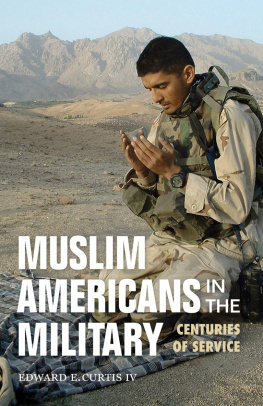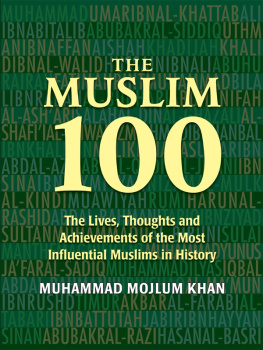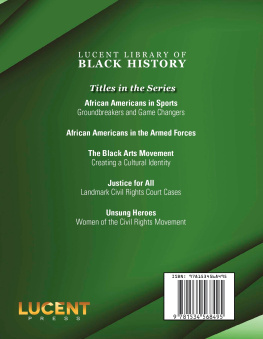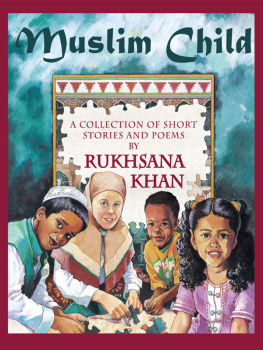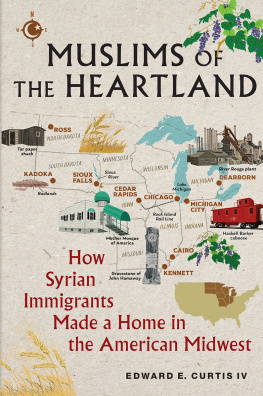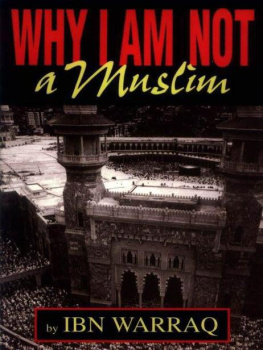MUSLIM AMERICANS IN THE MILITARY
MUSLIM AMERICANS IN THE MILITARY
CENTURIES OF SERVICE
EDWARD E. CURTIS IV
INDIANA UNIVERSITY PRESS
Bloomington and Indianapolis
This book is a publication of
Indiana University Press
Office of Scholarly Publishing
Herman B Wells Library 350
1320 East 10th Street
Bloomington, Indiana 47405 USA
iupress.indiana.edu
2016 by Edward E. Curtis IV
All rights reserved
No part of this book may be reproduced or utilized in any form or by any means, electronic or mechanical, including photocopying and recording, or by any information storage and retrieval system, without permission in writing from the publisher. The Association of American University Presses Resolution on Permissions constitutes the only exception to this prohibition.
The paper used in this publication meets the minimum requirements of the American National Standard for Information SciencesPermanence of Paper for Printed Library Materials, ANSI Z39.48-1992.
Manufactured in the United States of America
Names: Curtis, Edward E., author.
Title: Muslim Americans in the military : centuries of service / Edward E. Curtis IV.
Description: Bloomington : Indiana University Press, 2016. | Includes index.
Identifiers: LCCN 2016041283 | ISBN 9780253027177 (pbk. : alk. paper)
Subjects: LCSH: Muslim soldiersUnited StatesHistory. | MuslimsUnited StatesHistory. | United StatesArmed ForcesReligious life. | SoldiersReligious lifeUnited States.
Classification: LCC E184.M88 C876 2016 | DDC 355.0088/2970973dc23
LC record available at https://lccn.loc.gov/2016041283
1 2 3 4 5 21 20 19 18 17 16
To all families living with Rett Syndrome
CONTENTS
ACKNOWLEDGMENTS
THIS BOOK WAS THE IDEA of Ashley Runyon and her team at Indiana University Press, and I am thankful that they asked me to write it. David Hulsey, Michelle Sybert, Anna Francis, and Dee Mortensen were encouraging and helpful throughout the process. Peggy Solic offered essential assistance with illustrations and other aspects of the project. Rachel Rosolina was an effective project manager and a wonderful copyeditor.
I am deeply grateful to Imam Michael Saahir of Nur Allah Islamic Center in Indianapolis. He connected me with S.Sgt. Lyndon Bilal, commander of the Muslim American Veterans Association, and Bilal then put me in touch with Col. Nashid Salahuddin, Lt. Col. Shareda Hosein, and Lt. Col. Abdul-Rasheed Muhammad. Bilal also shared some important photographs from his own archive.
Mansoor Shams kindly put me in touch with Harris Khan.
My colleagues, Prof. Harvey Stark and Dr. Jeffrey Diamant, shared their research on Muslims in the military.
My colleague, Andrea Jain, helped me think though some of this material, and David Craig gave me lots of encouragement.
Filmmaker David Washburn, who is making a documentary on the subject, gave me advice, suggested contacts, and was generous with materials. In Indianapolis, Muslim Alliance of Indiana director Rima Khan Shahid, Muzaffar Ahmad, Muhammad Safder, and Shariq Siddiqui were willing to help.
My colleague, Jane Schultz, author of Women at the Front: Hospital Workers in Civil War America and historical adviser to the PBS series Mercy Street, translated the Civil Warera cursive on one of Nicholas Saids military records and then explained to me what it probably meant. Precious Rasheeda Muhammad, the Muslim History Detective, was willing to field inquiries about Said.
Doug Baum of the Texas Camel Corps talked to me about Hadji Ali. Philip Goff looked for some mention of Muslim troops in some Revolutionary Warera diaries. A long time ago, librarians at the State Historical Society of North Dakota photocopied interviews with Syrian and Lebanese settlers from their Ethnic History Files; I did not realize at the time that they would help me write the history of Muslim service members in World War I.
My family put up with me working some on the weekends to get this done quickly, and I am so grateful that it was only for a little while.
A portion of my royalties for this book will go to Rettsyndrome.org, which funds research and assists families living with Rett Syndrome. Rett Syndrome is a devastating neurological disorder that mainly affects young girls. In the case of our family, and many others, our daughter lost her ability to talk, walk, and use her hands in any effective way. But she understands everything going on around her, is incredibly social, and loves to go to school and play with her friends. Since the gene associated with Rett Syndrome has been identifiedit was discovered by neuroscientist Dr. Huda Zoghbiwe have hope that one day a cure will be found.
MUSLIM AMERICANS IN THE MILITARY
ONE
TWO FALLEN SOLDIERS NAMED KHAN
ARMY RESERVES CAPTAIN HUMAYUN KHAN, twenty-seven years old, knew that sacrifice might be required.
Could he know how symbolic that sacrifice would become?
It was his day off, but Khan wanted to check on the troops under his command. His mission, according to Khans senior officer, retired Maj. Gen. Dana J. H. Pitard, was to protect wheeled convoys and guard the gates of Forward Operating Base Warhorse in eastern Iraq. The 201st Forward Support Battalion, Humayuns unit, later wrote Pitard, was the most motivated and combat-oriented logistics unit I had ever seen.
More than one thousand Iraqis worked at Camp Warhorse, and Khans unit was responsible for inspecting their cars. According to Pitard, We had killed or wounded several innocent Iraqi drivers at our gates over the previous month for failing to heed our warning signs and our gate guards instructions. But Khan consistently worked to improve relations with the Iraqi workers and would do everything possible to prevent further accidents.
Khan worked from midnight to noon on June 7, 2004, and he was tired. Sgt. Crystal Shelby spoke freely with him, telling him that he needed to get some rest before working further.
But Khan insisted, as he was worried. Shelby drove him to the base entrance.
Khan was well-liked among his troops in the 201st Forward Support Battalion, First Infantry. According to S.Sgt. Marie Legros, he was a soldiers soldier just that type of person, wanting to make sure his soldiers were okay.
Sgt. Laci Walker said that he never put his rank about his care for his soldiers and comrades. Khan would throw an extra towel to someone in need, and he made sure that everyone knew they could steal sandwich condiments from his personal stash.
He tried to protect troops in harms way, putting himself between those under his command and the danger.
Soon after arriving at the base entrance on June 8, 2004, he saw an orange taxi winding its way through the gates serpentine barriers. This was during the morning rush at Camp Warhorse, when Iraqi workers would enter the base. Khan ordered his solders to get down. He walked toward the vehicle and gestured to the driver, indicating that he should stop. Humayun probably moved toward the suspicious vehicle to avoid killing the driver unnecessarily, reasoned Pitard.
A bomb detonated.
It killed Khan, two Iraqi civilians, and two insurgents.
Khan was laid to rest in Arlington National Cemetery with full military honors and Islamic funeral prayers. He was awarded a Bronze Star, a military medal for heroism, and a Purple Heart, the medal given to armed service members who were killed or injured in the line of duty.
Capt. Humayun Saqib Muazzam Khan (19762004) was one of three to six million Americans who identify as Muslim, followers of the religion of Islam. Born in the United Arab Emirates, where his family was living at the time, he traced his roots to Pakistan, a country inhabited by about 10 percent of all the worlds Muslims, around 167 million people. About one quarter of all Muslims in the United States have ethnic roots in South Asia, which includes the countries of Pakistan, Bangladesh, India, and depending on who is counting, Afghanistan.

